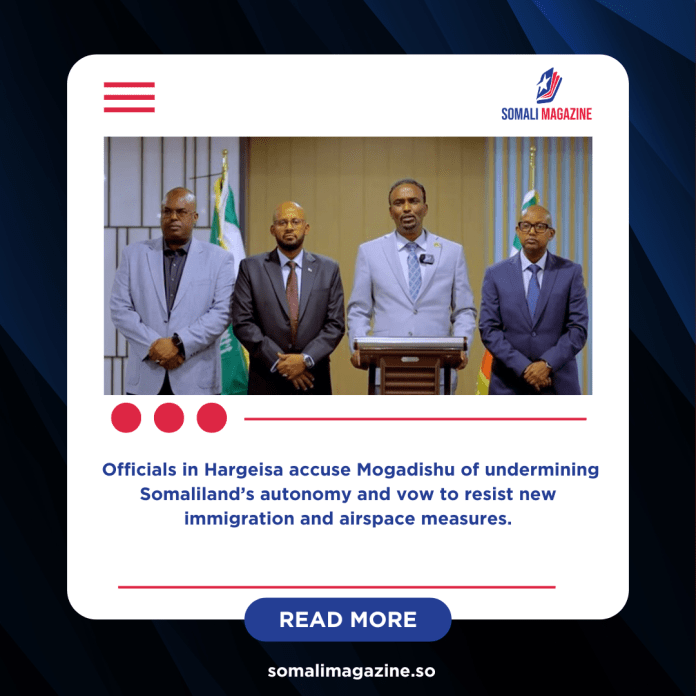Facebook Twitter (X) Instagram Somali Magazine - People's Magazine
Somaliland government officials met with representatives of the international community in Hargeisa on Wednesday to discuss their opposition to Somalia’s new E-visa system and outline the steps they are taking in response. The meeting highlighted growing tensions between Hargeisa and Mogadishu over airspace control and immigration policies.
Minister of Foreign Affairs Abdirahman Dahir Aden told reporters that the Somali federal government’s recent actions, particularly concerning airspace management, are politically motivated and designed to undermine Somaliland’s stability. He accused Mogadishu of trying to “destroy Somaliland” through these measures, saying that Somaliland’s democratic governance and relative peace are viewed as threats by the Somali authorities.
According to the minister, Somaliland clearly presented its position to the international community, explaining that the E-visa program imposed by Somalia infringes on its autonomy and governance. He said Somaliland would take all possible steps to stop the implementation of the system within its territories and airspace. Aden added that foreign diplomats and international representatives who attended the meeting have promised to relay Somaliland’s concerns to their respective governments.
Minister of the Presidency Khadar Hussein Abdi described the standoff as a “direct war” between Somaliland and Mogadishu. He urged Somalilanders to remain united, emphasizing that their independence and sovereignty were achieved through sacrifice and struggle. “Somaliland was won through blood and sacrifice, and we are ready again if necessary,” he said. “No one should think that we will surrender our rights because of an E-visa system.”
Meanwhile, Minister of Aviation and Airports Development Fu’aad Ahmed Nuux revealed that about 90 aircraft use Somaliland’s airspace daily. He explained that his ministry had contacted each airline and informed them about the new regulations. “Around 40 percent of the operators have agreed to follow our rules,” he said. “Those who refused were told to avoid our airspace, and most of them have already complied.”
Nuux noted that Somaliland has already begun implementing a series of actions in response to Somalia’s recent directives, taking what he called a “measured and cautious” approach to protect national interests. He mentioned that two steps have already been taken and that three more are planned as part of a phased response strategy. The minister stressed that managing airspace is a sensitive matter requiring coordination and unity among all Somaliland institutions.
In recent weeks, the Somaliland government has issued new orders concerning air traffic control, asserting its authority over the airspace it considers its own. One of the key directives states that no aircraft may enter or pass through Somaliland’s airspace without obtaining prior authorization from its aviation authorities. The move came after Somalia’s federal government introduced travel restrictions and the E-visa system, which Hargeisa views as an attempt to extend federal control over territories that it considers independent.
The disagreement over airspace and immigration management reflects a deeper political divide between the two governments. Somaliland, which declared independence from Somalia in 1991, operates as a self-governing entity with its own institutions, though it has not been internationally recognized as a separate state. The federal government in Mogadishu, on the other hand, insists that Somaliland remains part of Somalia and continues to assert authority over national airspace and border systems.
As the dispute intensifies, both sides appear determined to defend their positions. Somaliland leaders say they will protect their sovereignty at all costs, while also calling for calm and diplomatic engagement through international channels. The outcome of these discussions may determine how air travel and regional cooperation between Somalia and Somaliland evolve in the coming months.

